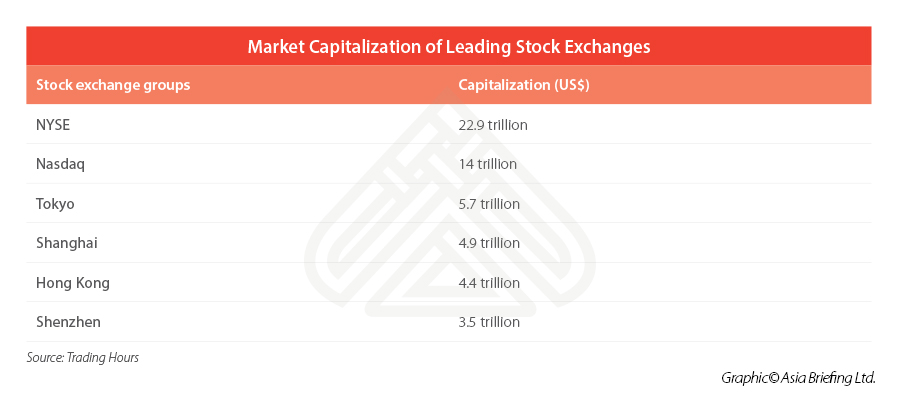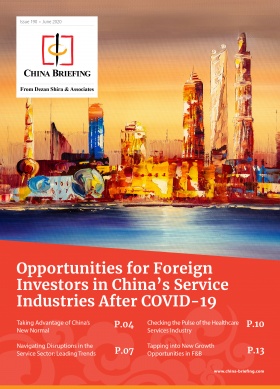China-Hong Kong Cross-Border Bank Accounts to be Permitted in Greater Bay Area
Chinese financial services set to challenge Nasdaq in market capitalization.
China’s Guangdong-Hong Kong-Macao Greater Bay Area (GBA) is reaching out to better provide cross-border financial services. The GBA encompasses South China’s Guangdong province and Hong Kong and Macao, thereby connecting China’s two special administrative regions with nine cities across the Pearl River Delta,
On June 29, the People’s Bank of China, the Hong Kong Monetary Authority, and the Monetary Authority of Macao jointly announced the launch of “Wealth Management Connect” – a cross-boundary wealth management pilot scheme only targeted at the GBA, which guarantees mutual access to wealth management products issued in Guangdong province, Hong Kong, and Macao and facilitates cross-border investments by individual residents in the GBA region.
Last month, it was reported that two brand-new exchanges would be created – the China Emissions Exchange in Guangzhou city of Guangdong province, which would focus on the trading of carbon emissions options and futures, and a Nasdaq-like yuan-dominated stock exchange in Macao, which is aimed at shifting Macao’s economy from gambling and entertainment. This would raise the total number of exchanges operating in the GBA to four – when factoring in the Hong Kong and Shenzhen Stock Exchanges.
It is understood that both Hong Kong and Chinese regulators are currently working on a further expansion of a pilot scheme that will significantly streamline bank account opening administration in the GBA and enable Hong Kong and Macao-based banks to remotely set up GBA bank accounts for their clients without the necessity for individuals to physically travel to the Chinese mainland in order to complete the required procedure and compliance checks.
All that will be required is for account holders to provide an active Chinese mainland mobile phone number to allow them to access mobile payment services provided by WeChat Pay or Alipay.
This has been rolled out after a Pilot scheme launched at the end of 2018 in Hong Kong resulted in 100,000 existing customers of the Bank of China (Hong Kong) applying to open Bank of China mainland accounts without having to leave the territory.
Hong Kong and Macao citizens and businesses can therefore retain all their cross-border banking in one place, with their own bank, and in this way avoid the inconvenience of managing multiple bank accounts and statements and remembering several online passwords.
The participating banks include the Bank of Communications, Bank of China, Industrial and Commercial Bank of China (Asia), HSBC, Standard Chartered Bank, Hang Seng Bank, and the Bank of East Asia. Overall, allowing the remote set up of bank accounts through a mainland mobile phone number will improve the innovation of cross-border financial services in the GBA and make the operating of mainland subsidiary operations far easier. This will serve as a boost for the Fintech industry and will help facilitate the launch of digital financial services.
It also means that despite the US removing Hong Kong as a preferred trade status partner, the territory is being re-positioned as a key component part of a rather wider financial services area and will soon be able to compete with larger global markets in the US and Japan.
As can be seen, the three Chinese exchanges – Hong Kong, Shenzhen and Shanghai – still have less collective clout than the Nasdaq and are just slightly over 50 percent of the total market capitalization of the New York Stock Exchange (NYSE). Hong Kong’s bourse will remain relatively small unless it were to be better integrated into the GBA alongside Chinese institutions to develop as part of a larger market and system.
The implications for investors in Hong Kong are to see the current political issues out and await the better and more advanced financial services that the territory will be able to be part of in coming years. The GBA Wealth Management Connect is set to become a major global player – with Hong Kong as its financial hub.
Related Reading
- What is the Greater Bay Area Plan?
- China’s Greater Bay Area in 2020: Opening up the Financial Industry, Promoting Integration
- Hong Kong’s China Gold and Silver Exchange Expands its Belt and Road Reach Using Shenzhen as an Asian Hub
About Us
China Briefing is written and produced by Dezan Shira & Associates. The practice assists foreign investors into China and has done so since 1992 through offices in Beijing, Tianjin, Dalian, Qingdao, Shanghai, Hangzhou, Ningbo, Suzhou, Guangzhou, Dongguan, Zhongshan, Shenzhen, and Hong Kong. Please contact the firm for assistance in China at china@dezshira.com.
We also maintain offices assisting foreign investors in Vietnam, Indonesia, Singapore, The Philippines, Malaysia, Thailand, United States, and Italy, in addition to our practices in India and Russia and our trade research facilities along the Belt & Road Initiative.
- Previous Article US Revokes Hong Kong’s Special Status: What are the Implications?
- Next Article China’s Business Reforms are Yielding Success: World Bank Report








